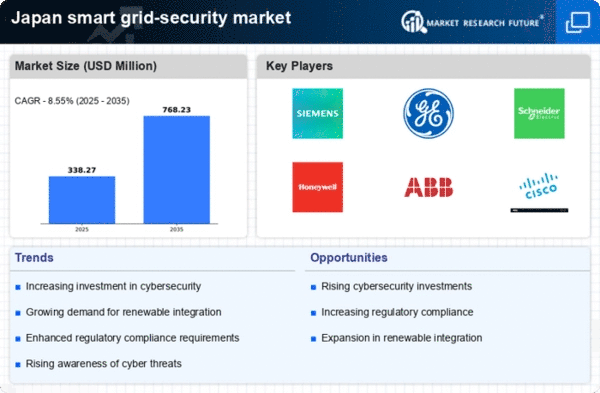Rising Cyber Threats
The increasing frequency and sophistication of cyber threats poses a significant challenge to the smart grid-security market. In Japan, the number of cyber incidents targeting critical infrastructure has surged, prompting utilities to enhance their security measures. Reports indicate that over 60% of Japanese energy companies have experienced cyberattacks in the past year. This alarming trend necessitates substantial investments in advanced cybersecurity technologies and solutions. As a result, the smart grid-security market is expected to witness robust growth, driven by the urgent need for utilities to protect their systems from potential breaches. The focus on securing the smart grid infrastructure is paramount. Any disruption could lead to severe consequences for both the economy and public safety.
Integration of IoT Devices
The proliferation of Internet of Things (IoT) devices within the energy sector is transforming the smart grid-security market. In Japan, the integration of IoT technologies into smart grid systems has increased operational efficiency but also introduced new vulnerabilities. It is estimated that by 2026, the number of connected devices in the energy sector will exceed 1 billion. This rapid expansion necessitates robust security protocols to safeguard against potential cyber threats. Consequently, the demand for advanced security solutions tailored for IoT devices is expected to rise significantly. The smart grid-security market must adapt to these changes, ensuring that security measures are in place to protect the integrity of the grid.
Government Initiatives and Funding
The Japanese government has recognized the importance of securing the smart grid infrastructure and has initiated various funding programs to bolster the smart grid-security market. With an allocation of approximately $500 million for cybersecurity initiatives, the government aims to support research and development in advanced security technologies. This funding is expected to stimulate innovation and encourage collaboration between public and private sectors. Furthermore, government-led initiatives to enhance cybersecurity standards and frameworks are likely to create a more secure environment for smart grid operations. As a result, the smart grid-security market is poised for growth, driven by these proactive measures and investments.
Public Awareness and Demand for Security
As awareness of cybersecurity issues grows among consumers, there is an increasing demand for enhanced security measures in the smart grid-security market. In Japan, public concern regarding data privacy and the security of energy systems has prompted utilities to prioritize cybersecurity initiatives. Surveys indicate that over 70% of consumers are willing to pay higher energy bills for improved security measures. This shift in consumer expectations is likely to drive utilities to invest more in advanced security technologies and solutions. The smart grid-security market must respond to this demand, ensuring that security measures align with public expectations and regulatory requirements.
Technological Advancements in Security Solutions
The rapid evolution of technology, particularly advancements in artificial intelligence and machine learning, is significantly impacting the smart grid-security market. In Japan, advancements in artificial intelligence (AI) and machine learning are being leveraged to enhance security protocols. These technologies enable utilities to detect and respond to threats in real-time, thereby improving the overall resilience of the smart grid. It is projected that the market for AI-driven security solutions will grow by over 30% annually in the coming years. As utilities increasingly adopt these innovative technologies, the smart grid-security market is likely to experience substantial growth, driven by the need for more effective and efficient security measures.
















